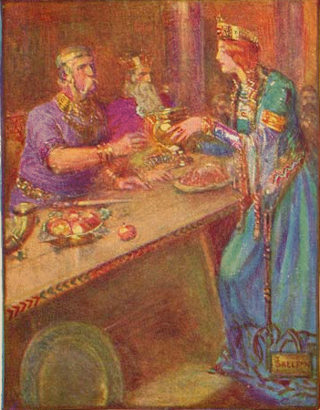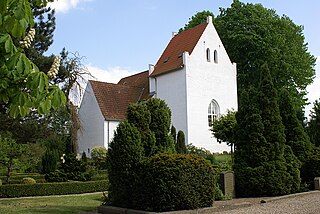Related Research Articles
Old English literature refers to poetry and prose written in Old English in early medieval England, from the 7th century to the decades after the Norman Conquest of 1066, a period often termed Anglo-Saxon England. The 7th-century work Cædmon's Hymn is often considered as the oldest surviving poem in English, as it appears in an 8th-century copy of Bede's text, the Ecclesiastical History of the English People. Poetry written in the mid 12th century represents some of the latest post-Norman examples of Old English. Adherence to the grammatical rules of Old English is largely inconsistent in 12th-century work, and by the 13th century the grammar and syntax of Old English had almost completely deteriorated, giving way to the much larger Middle English corpus of literature.
Old English literature refers to poetry and prose written in Old English in early medieval England, from the 7th century to the decades after the Norman Conquest of 1066, a period often termed Anglo-Saxon England. The 7th-century work Cædmon's Hymn is often considered as the oldest surviving poem in English, as it appears in an 8th-century copy of Bede's text, the Ecclesiastical History of the English People. Poetry written in the mid 12th century represents some of the latest post-Norman examples of Old English. Adherence to the grammatical rules of Old English is largely inconsistent in 12th-century work, and by the 13th century the grammar and syntax of Old English had almost completely deteriorated, giving way to the much larger Middle English corpus of literature.

Grendel is a character in the Anglo-Saxon epic poem Beowulf. He is one of the poem's three antagonists, all aligned in opposition against the protagonist Beowulf. He is referred to as both an eoten and a þyrs, types of beings from wider Germanic mythology. He is also described as a descendant of the Biblical Cain and "a creature of darkness, exiled from happiness and accursed of God, the destroyer and devourer of our human kind." He is usually depicted as a monster or a giant, although his status as a monster, giant, or other form of supernatural being is not clearly described in the poem and thus remains the subject of scholarly debate. The character of Grendel and his role in the story of Beowulf have been subject to numerous reinterpretations and re-imaginings. Grendel is feared by all in Heorot but Beowulf, who kills both him and his mother.

Heorot is a mead-hall and major point of focus in the Anglo-Saxon poem Beowulf. The hall serves as a seat of rule for King Hrothgar, a legendary Danish king. After the monster Grendel slaughters the inhabitants of the hall, the Geatish hero Beowulf defends the royal hall before subsequently defeating him. Later Grendel's mother attacks the inhabitants of the hall, and she too is subsequently defeated by Beowulf.

Hygd, introduced in line 1925 of the poem Beowulf, is married to of King Hygelac of Geatland. She is the daughter of Hæreth.
Wiglaf is a character in the Anglo-Saxon epic poem Beowulf. He is the son of Weohstan, a Swede of the Wægmunding clan who had entered the service of Beowulf, king of the Geats. Wiglaf is called Scylfing as a metonym for Swede, as the Scylfings were the ruling Swedish clan. While in the service of the Scylfing Onela, king of the Swedes, Weohstan killed the rebel prince Eanmund and took his sword as a trophy; Wiglaf later inherited it. Weohstan belonged to the clan of the Wægmundings, the same clan Beowulf's father Ecgþeow belonged to; so Wiglaf is Beowulf's distant cousin, and his only living relative at the time of Beowulf's death.

Wealhtheow is a queen of the Danes in the Old English poem, Beowulf, first introduced in line 612.

Beowulf is a legendary Geatish hero in the eponymous epic poem, one of the oldest surviving pieces of English literature.

Grendel's mother is one of three antagonists in the anonymous Old English poem Beowulf, the other two being Grendel and the dragon. Each antagonist reflects different negative aspects of both the hero Beowulf and the heroic society in which the poem is set. Grendel's mother is introduced in lines 1258b to 1259a as: "Grendles modor/ides, aglæcwif".

In the Old English epic poem Beowulf, Unferth or Hunferth is a thegn of the Danish lord Hrothgar. He appears five times in the poem — four times by the name 'Hunferð' and once by the appellation "the son of Eclafes". The name Unferth does not appear in any Old English manuscript outside of the Nowell Codex, which contains Beowulf, and the meaning of the name is disputed. Several scholarly theories about Unferth have been proposed.

Modthryth, Thryth, and Fremu are reconstructed names for a character who figures as the queen of King Offa in Beowulf.

The final act of the Anglo-Saxon poem Beowulf includes Beowulf's fight with a dragon, the third monster he encounters in the epic. On his return from Heorot, where he killed Grendel and Grendel's mother, Beowulf becomes king of the Geats and rules wisely for fifty years until a slave awakens and angers a dragon by stealing a jewelled cup from its lair. When the angry dragon mercilessly burns the Geats' homes and lands, Beowulf decides to fight and kill the monster personally. He and his thanes climb to the dragon's lair where, upon seeing the beast, the thanes flee in terror, leaving only Wiglaf to battle at Beowulf's side. When the dragon wounds Beowulf fatally, Wiglaf attacks it with his sword, and Beowulf kills it with his dagger.

Beowulf: A Translation and Commentary is a prose translation of the early medieval epic poem Beowulf from Old English to modern English. Translated by J. R. R. Tolkien from 1920 to 1926, it was edited by Tolkien's son Christopher and published posthumously in May 2014 by HarperCollins.
John D. Niles is an American scholar of medieval English literature best known for his work on Beowulf and the theory of oral literature.
Helen Damico was a Greek-born American scholar of Old English and Old English literature.

The Gevninge helmet fragment is the dexter eyepiece of a helmet from the Viking Age or end of the Nordic Iron Age. It was found in 2000 during the excavation of a Viking farmstead in Gevninge, near Lejre, Denmark. The fragment is moulded from bronze and gilded, and consists of a stylised eyebrow with eyelashes above an oval opening. There are three holes at the top and bottom of the fragment to affix the eyepiece to a helmet. The fragment is significant as rare evidence of contemporaneous helmets, and also for its discovery in Gevninge, an outpost that is possibly connected to the Anglo-Saxon epic Beowulf. It has been in the collection of the Lejre Museum since its discovery, and has been exhibited internationally as part of a travelling exhibition on Vikings.

Gevninge is a small town, with a population of 1,646, in Lejre Municipality on the island of Zealand in Denmark. Its old section is located alongside a small river, Lejre Å, approximately 2 kilometres (1.2 mi) from its mouth at Roskilde Fjord.

Beowulf: A New Verse Translation is a verse translation of the Old English epic poem Beowulf into modern English by the Irish poet and playwright Seamus Heaney. It was published in 1999 by Farrar, Straus, and Giroux and Faber and Faber, and won that year's Whitbread Book of the Year Award.

The difficulty of translating Beowulf from its compact, metrical, alliterative form in a single surviving but damaged Old English manuscript into any modern language is considerable, matched by the large number of attempts to make the poem approachable, and the scholarly attention given to the problem.
References
- 1 2 3 4 "Marijane Osborn Profile, Department of English". UC Davis. 26 February 2015.
- ↑ Osborn, Marijane (1974). "The Vanishing Seabirds in "The Wanderer"". Folklore. 85 (2): 122–127. doi:10.1080/0015587X.1974.9716543. JSTOR 1260059.
- ↑ Osborn, Marijane (2003). "Tir as Mars in the Old English Rune Poem". ANQ. 16: 3–13. doi:10.1080/08957690309598179. S2CID 161242275.
- ↑ Osborn, Marijane; Enfijian, Harry (2009). "The Iconographic Parodies Bracketing Chaucer's Summoner's Tale". In Hollengreen, L H (ed.). Translatio or the Transmission of Culture in the Middle Ages and the Renaissance: Modes and Messages. Brepols. ISBN 978-2-503-51892-3.
- ↑ Osborn, Marijane (2009). ""Strangely Jumbled": Attitudes Toward the Native Other in Melville's and D. H. Lawrence's Captivity Narratives". Leviathan. 11 (2): 57–70. doi:10.1111/j.1750-1849.2009.01318.x. S2CID 145573200.
- 1 2 3 Liuzza, R M (2006). "Editor's Note: Grendel's Mother Broods Over Her Feral Son". Old English Newsletter. 39 (3): 20–21.
- 1 2 3 Osborn, Marijane. "Featured Fellow: Marijane Osborn". University of Edinburgh.
- ↑ MacPherson, Alan (1995). "Review: Landscape of Desire: Partial Stories of the Medieval Scandinavian World by Gillian R. Overing, Marijane Osborn". Geographical Review. 85 (3): 404–406. doi:10.2307/215293. JSTOR 215293.
- ↑ "Visions and Ruins Q and A with Joshua Davies". University of Manchester. 14 May 2018.
- ↑ Phelpstead, Carl (2014). "Ecocriticism and Eyrbyggja saga". Leeds Studies in English. New Series XLV: 1–18.
- ↑ Osborn, Marijane. "Writers Inspire: Beowulf, a Verse Translation with Treasures of the Ancient North (Part 1)". University of Oxford: Writers Inspire.
- ↑ Osborn, Marijane (2003). "Annotated List of Beowulf Translations". Arizona Centre for Medieval and Renaissance Studies. Archived from the original on 2018-06-27.
- ↑ Osborn, Marijane (2020). "Princess Freawaru and Hamlet's Other Uncle". Medium Aevum. 89: 356–373.
- ↑ Osborn, Marijane; Hawes, Janice (2007). "Afterword: Amlæd (Hamlet)". ANQ. 20: 74–77.
- ↑ Beal, Jane; Bradshaw Busbee, Mark. "Translating the Past: Essays on Medieval Literature in Honor of Marijane Osborn". Arizona Centre for Medieval Studies.
- ↑ "Beowulf: A Verse Translation with Treasures of the Ancient North (Part 1)". University of Oxford. Retrieved 30 November 2020.
- ↑ Damico, Helen; Hennessey, Olsen Alexandra; Olsen, Alexandra Hennessey (1990). New Readings on Women in Old English Literature. Indiana University Press. pp. xi–xiii. ISBN 978-0-253-20547-6.
- ↑ Osborn, Marijane (2006). "Grendel's Mother Broods Over Her Feral Son". The Old English Newsletter. 39 (3): 20–21.
- ↑ Osborn, Marijane (2015). "Thirty Viking Haikus". Stand Magazine. Vol. 13, no. 2.
